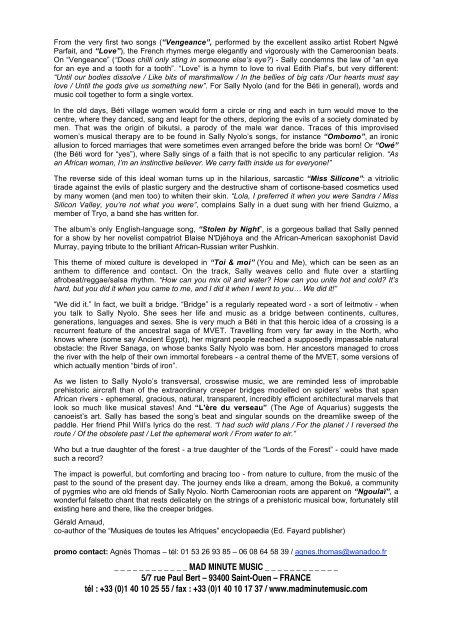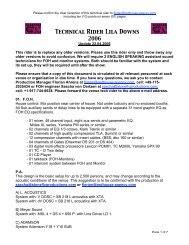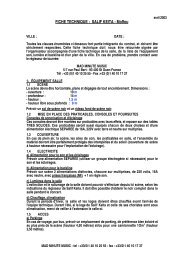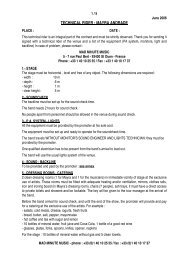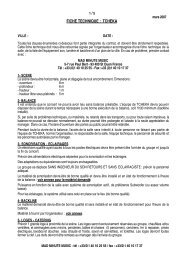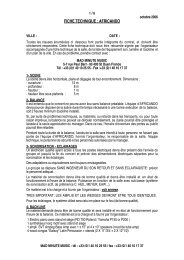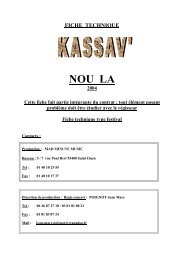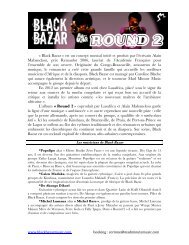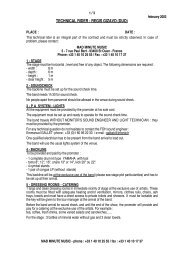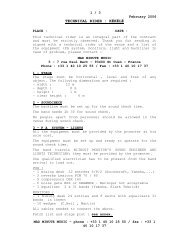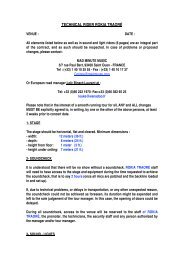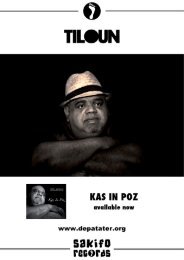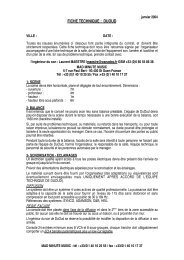SALLY NYOLO - Mad Minute Music
SALLY NYOLO - Mad Minute Music
SALLY NYOLO - Mad Minute Music
Create successful ePaper yourself
Turn your PDF publications into a flip-book with our unique Google optimized e-Paper software.
From the very first two songs (“Vengeance”, performed by the excellent assiko artist Robert Ngwé<br />
Parfait, and “Love”), the French rhymes merge elegantly and vigorously with the Cameroonian beats.<br />
On “Vengeance” (“Does chilli only sting in someone else’s eye?) - Sally condemns the law of “an eye<br />
for an eye and a tooth for a tooth”. “Love” is a hymn to love to rival Edith Piaf’s, but very different:<br />
“Until our bodies dissolve / Like bits of marshmallow / In the bellies of big cats /Our hearts must say<br />
love / Until the gods give us something new”. For Sally Nyolo (and for the Béti in general), words and<br />
music coil together to form a single vortex.<br />
In the old days, Béti village women would form a circle or ring and each in turn would move to the<br />
centre, where they danced, sang and leapt for the others, deploring the evils of a society dominated by<br />
men. That was the origin of bikutsi, a parody of the male war dance. Traces of this improvised<br />
women’s musical therapy are to be found in Sally Nyolo’s songs, for instance “Ombomo”, an ironic<br />
allusion to forced marriages that were sometimes even arranged before the bride was born! Or “Owé”<br />
(the Béti word for “yes”), where Sally sings of a faith that is not specific to any particular religion. “As<br />
an African woman, I’m an instinctive believer. We carry faith inside us for everyone!”<br />
The reverse side of this ideal woman turns up in the hilarious, sarcastic “Miss Silicone”: a vitriolic<br />
tirade against the evils of plastic surgery and the destructive sham of cortisone-based cosmetics used<br />
by many women (and men too) to whiten their skin. “Lola, I preferred it when you were Sandra / Miss<br />
Silicon Valley, you’re not what you were”, complains Sally in a duet sung with her friend Guizmo, a<br />
member of Tryo, a band she has written for.<br />
The album’s only English-language song, “Stolen by Night”, is a gorgeous ballad that Sally penned<br />
for a show by her novelist compatriot Blaise N'Djéhoya and the African-American saxophonist David<br />
Murray, paying tribute to the brilliant African-Russian writer Pushkin.<br />
This theme of mixed culture is developed in “Toi & moi” (You and Me), which can be seen as an<br />
anthem to difference and contact. On the track, Sally weaves cello and flute over a startling<br />
afrobeat/reggae/salsa rhythm. “How can you mix oil and water? How can you unite hot and cold? It’s<br />
hard, but you did it when you came to me, and I did it when I went to you… We did it!”<br />
“We did it.” In fact, we built a bridge. “Bridge” is a regularly repeated word - a sort of leitmotiv - when<br />
you talk to Sally Nyolo. She sees her life and music as a bridge between continents, cultures,<br />
generations, languages and sexes. She is very much a Béti in that this heroic idea of a crossing is a<br />
recurrent feature of the ancestral saga of MVET. Travelling from very far away in the North, who<br />
knows where (some say Ancient Egypt), her migrant people reached a supposedly impassable natural<br />
obstacle: the River Sanaga, on whose banks Sally Nyolo was born. Her ancestors managed to cross<br />
the river with the help of their own immortal forebears - a central theme of the MVET, some versions of<br />
which actually mention “birds of iron”.<br />
As we listen to Sally Nyolo’s transversal, crosswise music, we are reminded less of improbable<br />
prehistoric aircraft than of the extraordinary creeper bridges modelled on spiders’ webs that span<br />
African rivers - ephemeral, gracious, natural, transparent, incredibly efficient architectural marvels that<br />
look so much like musical staves! And “L'ère du verseau” (The Age of Aquarius) suggests the<br />
canoeist’s art. Sally has based the song’s beat and singular sounds on the dreamlike sweep of the<br />
paddle. Her friend Phil Will’s lyrics do the rest. “I had such wild plans / For the planet / I reversed the<br />
route / Of the obsolete past / Let the ephemeral work / From water to air.”<br />
Who but a true daughter of the forest - a true daughter of the “Lords of the Forest” - could have made<br />
such a record?<br />
The impact is powerful, but comforting and bracing too - from nature to culture, from the music of the<br />
past to the sound of the present day. The journey ends like a dream, among the Bokué, a community<br />
of pygmies who are old friends of Sally Nyolo. North Cameroonian roots are apparent on “Ngoulaï”, a<br />
wonderful falsetto chant that rests delicately on the strings of a prehistoric musical bow, fortunately still<br />
existing here and there, like the creeper bridges.<br />
Gérald Arnaud,<br />
co-author of the “Musiques de toutes les Afriques” encyclopaedia (Ed. Fayard publisher)<br />
promo contact: Agnès Thomas – tél: 01 53 26 93 85 – 06 08 64 58 39 / agnes.thomas@wanadoo.fr<br />
_ _ _ _ _ _ _ _ _ _ _ _ MAD MINUTE MUSIC _ _ _ _ _ _ _ _ _ _ _ _<br />
5/7 rue Paul Bert – 93400 Saint-Ouen – FRANCE<br />
tél : +33 (0)1 40 10 25 55 / fax : +33 (0)1 40 10 17 37 / www.madminutemusic.com


